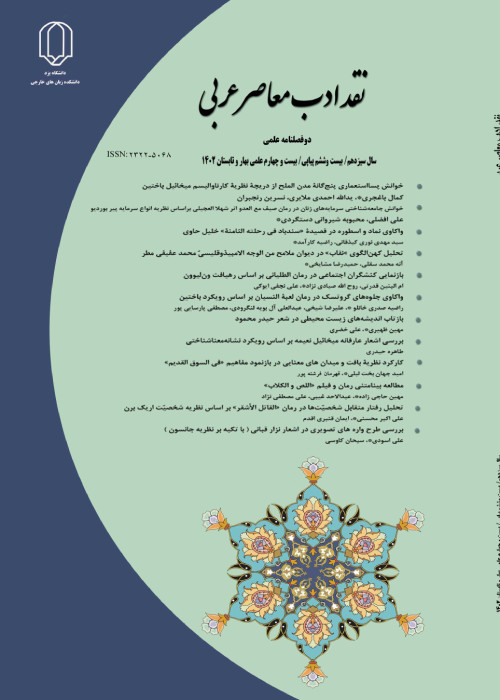Foregrounding in the poems of Mohammad Saeed Al-Haboubi based on Jeffreylich's theory
Author(s):
Article Type:
Research/Original Article (دارای رتبه معتبر)
Abstract:
Introduction
Seyed Mohammad Saeed Al-Haboubi is one of the contemporary poets who was born in Najaf in 1266 AH and died in 1333 AH. Al-Habubi's poetic themes were a description of nature and the sincere praise of religious friends and elders. His poetic genius along with the classical culture of Najaf granted his poetry a high position while avoiding degeneration. The present study examines the foregrounding in the divan of Mohammad Saeed Haboubi and helps the audience to better understand the concept of temporalization, stylistics and semantics. To express the ability and the art of grain in foregrounding poetic themes, verbal and semantic constructions are used. One of the aims of this research is to acquaint the audience with the formalistic aspects of the poet's poems, on which no research has been done yet. The poet, on the basis of imagination and emotion, brings up the repetitive words of the standard language to which the audience is accustomed in a new and fascinating way in the form of poetry. In his poetry, the change in the structure of syntactic sentences and devices gives new life to ordinary speech.The words acquire music and allitration that have a greater impact on the audience. Defamiliarization takes place in language too. The change in the prosodic weight of classical poetry to new poetry is one of the signs of abnormality. Poetry is a kind of de-familiarization in language, which, according to formalist theories, is divided into two categories: deviation and extra regularity. Jeffrey Leech has categorized these norms into two types: linguistic and semantic. According to Leach's theory, which novel element in Bean's poems has a higher value in semantic deviation?, what forms of stylistic and temporal familiarization have appeared in Habubi's poetry?, and how has the semantic novelty foregrounded the ambiguous words in his poetry? Methodology
No research has been done on the foregrounding in Habubi's poems so far. So, this article intends to use a descriptive-analytical method to examine the poet's abnormality in constructing forms of aesthetics and reviving words based on Leach's theory. The research method of this research is qualitative and descriptive using content analysis, which is done to objectively and qualitatively explain the content and concept of written texts in a systematic way. In the present article, the studied components are foregrounding, semantic deviation, deviation, extra regularity, and semantics of Seyed Mohammad Saeed Haboubi's poems based on Leach’s theory. Due to the importance of foregrounding in the literature, this research is of significance. Results and Discussion
The subject of this research in the field of extra regularity is how the poet describes some elements of novel such as "ambiguity", "proportionality" and "repetition" to define "polysemy", "semantic network" and "phonology". In terms of rule-making, how did the poet use "archaism" to relate the text to ancient culture, and how did he use the words of astronomy to improve the music and the image? The research findings can be reviewed in several areas. The result of the research refers to the function of different types of "Equivoque "in explaining ambiguous words, motivating the reader and foregrounding the relationship between words and meanings. The poet has also used "archaism" in both literary and religious forms, using a variety of Arabic terms in the field of symbolism and astronomy to create poetic images. Lexically, the result of this research on "Al-Haboubi" poems refers to the dual relationship between word and meaning. The choice and arrangement of words in a poetic sentence indicates the semantic connection of the words with the history of the language of poetry. According to Leech's theory, "temporal deviation" in the form of "archaism" in his poetry has two religious and literary forms. The use of ancient words, in addition to recalling historical events in the reader's mind, has refreshed repetitive words. Regarding religious archaism, the common affairs of Muslims, such as Hajj, have a higher percentage than the other religious issues, such as the religion of the poet and the signs of unity among Muslims in monotheism. In literary archaism, he has referred to the words of the poets of the pre-Islamic period, such as Amr al-Qays and Zuhair ibn Abi Aslami. He also refers to the brilliant history of Arabic poetry and uses its methods to create novelty in the repetitive words of his time. Haboubi uses the words Arabic grammar and astronomy more than anything else in "Stylization". He used these words to create an imaginary rhyme array. In "Semantic Abnormality", he has used novel method for imaginative illustration and polysemy for the audience. Using an array of repeated letters and consonants, the poet has foregrounded the allitration of letters in his poem. He used observance better in poetry. In most verses, he has used a proportional array. It has become a semantic network of words to create a picture of a subject in the mind of the audience. Seyed Haboubi has used these devices to do foregrounding in poetry.Keywords:
Language:
Persian
Published:
نشریه نقد ادب معاصر عربی, Volume:11 Issue: 20, 2021
Pages:
237 to 263
magiran.com/p2342531
دانلود و مطالعه متن این مقاله با یکی از روشهای زیر امکان پذیر است:
اشتراک شخصی
با عضویت و پرداخت آنلاین حق اشتراک یکساله به مبلغ 1,390,000ريال میتوانید 70 عنوان مطلب دانلود کنید!
اشتراک سازمانی
به کتابخانه دانشگاه یا محل کار خود پیشنهاد کنید تا اشتراک سازمانی این پایگاه را برای دسترسی نامحدود همه کاربران به متن مطالب تهیه نمایند!
توجه!
- حق عضویت دریافتی صرف حمایت از نشریات عضو و نگهداری، تکمیل و توسعه مگیران میشود.
- پرداخت حق اشتراک و دانلود مقالات اجازه بازنشر آن در سایر رسانههای چاپی و دیجیتال را به کاربر نمیدهد.
In order to view content subscription is required
Personal subscription
Subscribe magiran.com for 70 € euros via PayPal and download 70 articles during a year.
Organization subscription
Please contact us to subscribe your university or library for unlimited access!



